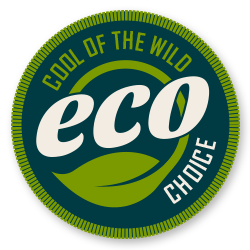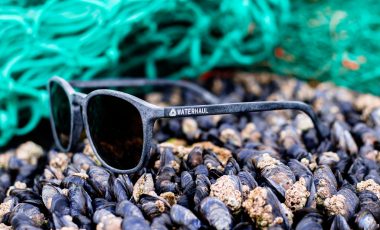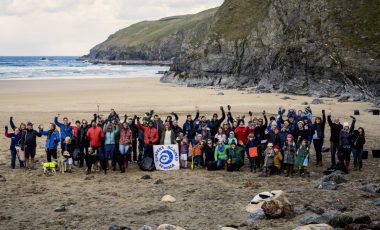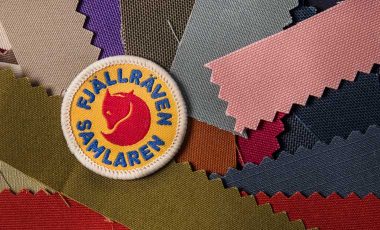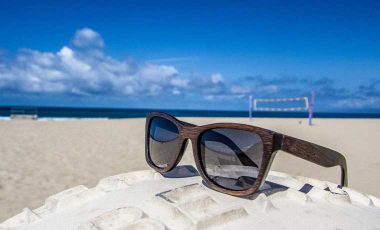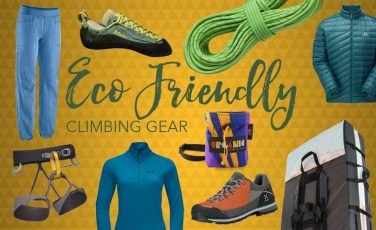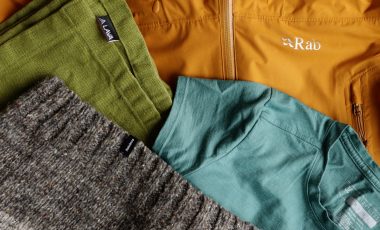Every year, it’s estimated that over 640,000 tonnes of plastic fishing gear is lost or discarded in our oceans. In a phenomenon known as ghost fishing, these nets and lines then continue to catch and kill marine life, which in turn attracts even more species, resulting in an ongoing loop of catches. Thanks to the durable, high-quality plastics used to make the fishing gear, the nets and lines can persist in our oceans for over 500 years without degrading, before eventually washing up on our shores.
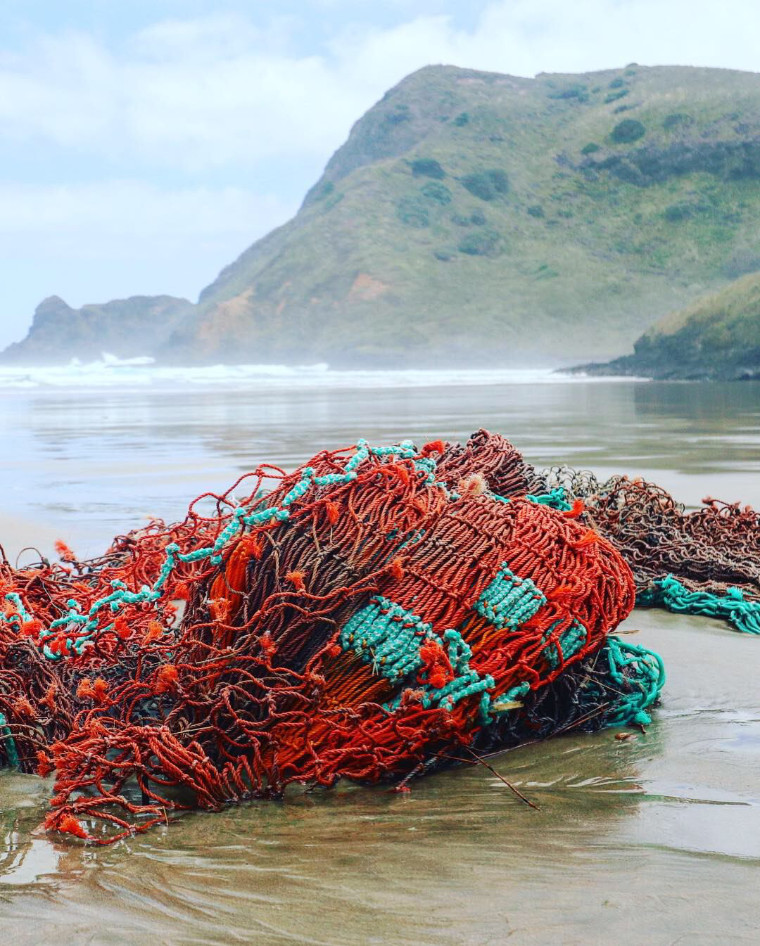
About Waterhaul
Founded in Cornwall in 2018, Waterhaul is a social enterprise run by a group of frustrated surfers, marine conservationists and ocean enthusiasts who were growing tired of seeing our beloved coastlines, both in Cornwall and further afield, inundated with ghost gear. As we continued to find lines and offcuts daily, our pile of collected nets grew and grew (as did our neighbour’s disapproval of the smell!), which motivated us towards finding a solution.
We have repurposed the fishing industry’s term ‘waterhaul’ meaning an empty catch. For us, hauling an empty net from the ocean is a success core to our manifesto
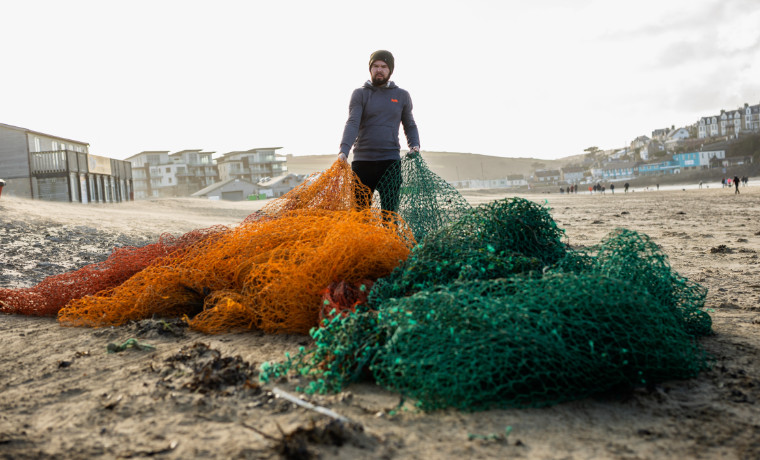
Transforming trash
A key moment was the realisation that all of the properties that make plastic fishing gear such a threat to our oceans; the size and abundance of the nets, the high-quality polymers used, and the urgency to remove the plastic from harm’s way, all make fishing gear a desirable recycling resource. We partnered with several mechanical recycling facilities to help sort, wash, shred and process various forms of end-of-life fishing gear, before finally producing our first pair of recycled ocean plastic sunglasses in 2018. As we suspected, fishing nets durable enough to last 500 years at sea make for super-durable sunglasses frames!
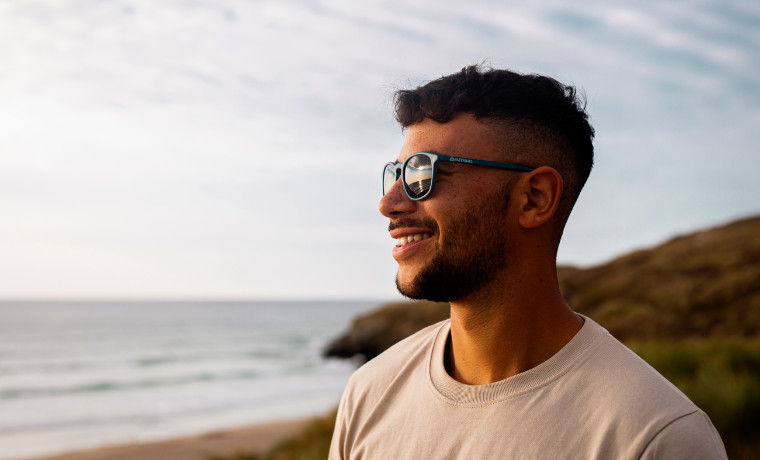
Sustainable sunglasses (and other products)
Alongside being exceptionally sustainable, we wanted our sunglasses to meet the technical demands of adventure. We use mineral glass lenses in our sunglasses, which offer far superior optical quality, scratch resistance and sustainability than comparable high-end plastic counterparts. Additionally, our lenses also offer full UVA / UVB 400 protection, to protect eyes from harmful ultraviolet light, and are also polarised, shielding eyes from glare. Alongside being ‘symbols for change’, our sunglasses are designed to last a lifetime, reflecting the nets that would last centuries in the ocean.
Closed-loop production
Whilst we reuse plastic waste to create products that are designed to last, we want to fully account for every single piece of recycled plastic that Waterhaul produce. Should our eyewear reach the end of its lifecycles, we offer a lifetime warranty to recapture every pair of broken or unwanted frames. Just like the fishing nets we intercept from the ocean, returned frames will be washed, sorted, shredded and repurposed into a new pair of sunglasses, ready for new adventures. The beauty of our closed-loop production process means that we can guarantee that every single pair of sunglasses returned to us will be repaired or recycled, demonstrating a circular economy.
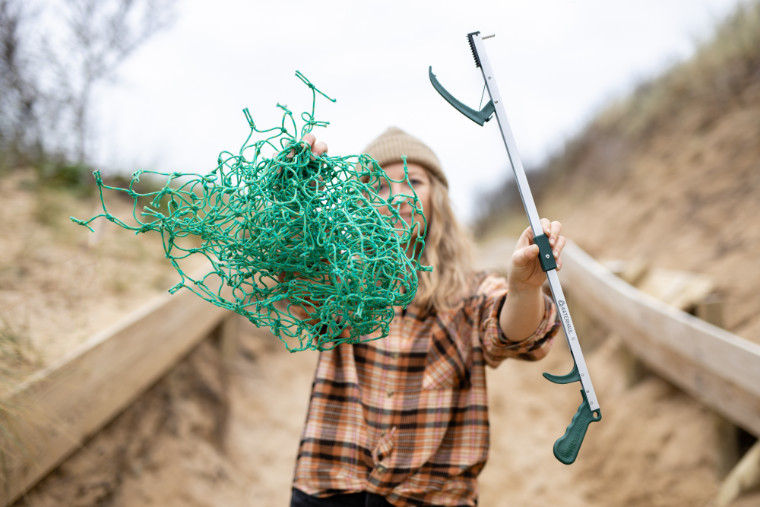
Beach cleaning products
Whilst we conducted beach cleans and recovered ghost gear and other litter along the Cornish coastline, we began to develop the idea for beach cleaning equipment made from recycled ocean plastic. It didn’t make sense to us that the equipment we were using to help take action against plastic pollution contained non-recyclable virgin plastics. Instead, would it not feel more inspired and hopeful if the beach cleaning equipment was constructed from the very ocean plastic material we were intercepting?
We developed litter pickers that utilise 100% recycled polypropylene, collected ourselves from the Cornish coast, to create the jaws, handles and triggers, which are then paired with recycled aluminium shafts and 100% recycled PET string. We designed the plastic parts with sufficient thickness to be rugged and strong, enabling us to utilise the degraded and less pristine fishing nets that we find on mass. Unlike our sunglasses, we don’t have to be fussy with which nets we recycle to deliver a great product.
Beach cleaning equipment constructed from the very ocean plastic material we are intercepting
To increase our demand for fishing gear even further, we have also released litter picking bag hoops, which securely hold a bin bag or refuse sack open; essential for windy litter picks! Our bag hoops are made from 100% recycled polypropylene, which predominantly comes in the form of plotting lines – one of the most common forms of end-of-life fishing gear that we find on our coastline. Each hoop creates a significant positive impact, with 300 grams (roughly 7 meters) of the rope required to be recovered and recycled. This plastic we have found to be extremely durable, and it even outperformed virgin plastics in our drop test comparisons, thanks to its flexible properties.
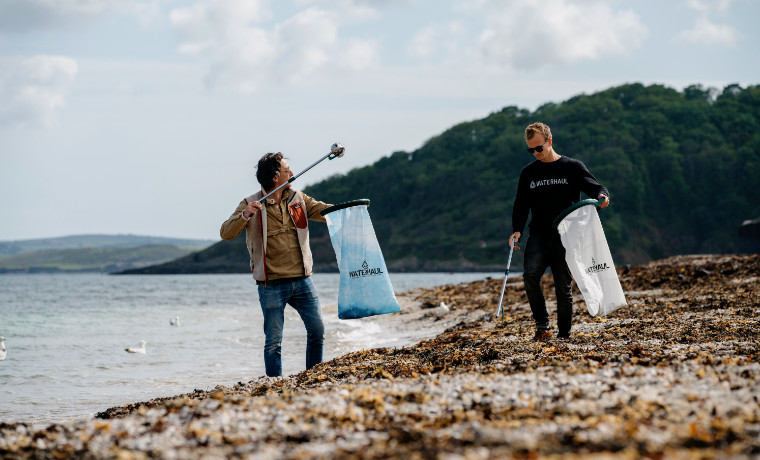
How YOU can have an impact
Litter picking or beach cleaning is a great way to play your part in tackling the plastic pollution crisis locally. The act of picking up litter from the ground is a simple action, but also an incredibly important one given that more than two million pieces of litter are dropped in the UK every day. However, we know that sometimes people need a little extra push to get started, and we’re hoping our recycled ocean plastic products might be just the push you need to get out and make a difference and inspire further positive action!
We have repurposed the fishing industry’s term ‘waterhaul’ meaning an empty catch. Unlike its original negative connotations, for us, hauling an empty net from the ocean is a success core to our manifesto. By creating equipment to inspire and enable you to take action against plastic pollution, we can multiply the overall positive impact: we collect waste fishing gear to produce the product itself, but with your help, it can go on to remove much more plastic from the environment.

